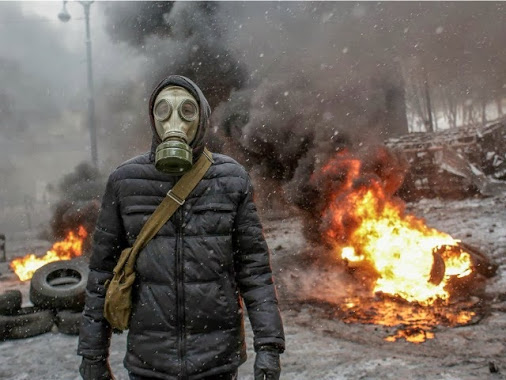Opinion
Christian Purefoy: Why Nigerians Should Be Worried About Happenings In Ukraine

Since it’s return to democracy in 1999, the global order played in Nigeria’s democratic favour.
High oil prices, the mobile phone revolution, good will from the West, the end of the Cold War (and thus getting support from competing blocks to support numerous military regimes) and the opening up of an unprecedented global market and investment out of the West.
But the global conditions to support the nascent Nigerian democracy are now gone. After Russia invaded Ukraine – their stock market fell 10.8%.
China, Russia, Turkey, Brazil and many other emerging market economies are slowing down. Global investors are pulling out as the US FED tapers QE(the end of ‘easy money’) and in fear old-fashioned local politics gets in the way of good economic decisions.
Nigeria is not immune – in January, the Nigerian stock market had it’s worst performance since the 2008 crash. And, more importantly for most Nigerians – even before the removal of Sanusi – the value of the Naira is under huge pressure. Russia’s actions will further cement in investors minds that Emerging Economies are great risks. And by removing Sanusi, Nigeria is not doing anything to encourage them.
Economics of Emerging Markets:
The West:
Despite its many faults, the West is largely regarded as the defender of democracy. But since the Iraq war and the financial crisis – the West is now morally & economically fragile.
Russia’s invasion of Ukraine risks exposing these limitations – and so far the Western response has been meek and confused to say the least.
If this article is correct – it’s because Russia no longer fears the West because the West will not clamp down on the billions of corrupt money pouring into place like the City of London.
http://www.politico.com/magazine/story/2014/03/russia-vladimir-putin-the-west-104134.html#.UxXLG_R_uLZ
And as a leaked UK document shows – it appears that the UK is reluctant to risk that money – quote from the document:
“Not support, for now, trade sanctions … or close London’s financial centre to Russians.”
We don’t know the exact figures, but like Russia, Nigeria also has enormous amounts of money invested in the West. Any would-be tyrant now knows the US and UK are reluctant to put such investment at risk for the sake of ‘freedom’.
Mobile Phones & Internet:
The Arab Spring brought hope that the mobile/internet revolution will make governments more transparent and accountable. This dream ended with the Egyptian Coup of 2013. Although the mobile/internet revolution has only just begun – the reality, for now, is that “old, hard power” still dominates RealPolitik. This is again the case with Ukraine where the latest revolution is threatened by Russian hard power. I would argue that in Nigeria, the mobile phone and internet has done almost nothing to bring about greater transparency & accountability by the government for the people. With Ukraine, and particularly Egypt, the forces against democracy have all the evidence they need to ignore it further.
Russia-China: http://blogs.channel4.com/paul-mason-blog/russian-invasion-ukraine-push-west-economic-war/441 If a new global block in the East does open up – with Russia, but also especially with China desperate for Nigeria’s oil – the old ‘alignment’ game that regimes in Africa played so well during the Cold War would be back. With China’s desperate thirst for oil and lack of questions about where it comes from – it already exists.
As yet, China has remained very quiet. But, as Paul Mason (Channel4) warns – this conflict has the potential to spiral out of control and create a new “East vs West ” block. You can read his argument here – but suffice to say – Russia and China are not interested in democracy.
Democracy:
Nigerians hope that, with enough time & elections, democracy will be further entrenched in the country. For example, the 2011 elections were widely regarded as an improvement on 2007 and there is now, theoretically, a valid opposition party.
But democracy and free/fair elections are under threat globally. As the Economist states in their recent article:
“Freedom House reckons that 2013 was the eighth consecutive year in which global freedom declined, and that its forward march peaked around the beginning of the century. Between 1980 and 2000 the cause of democracy experienced only a few setbacks, but since 2000 there have been many.”
If the forces against democracy in Nigeria see that externally the West’s influence is in retreat – they will fill the void.
2015:
The forces that aligned in the last two decades across the globe to give hope that democracy, freedom and economic improvement – are now under threat – with particular consequence for Nigeria.
Nigerians should watch unfolding events in Ukraine (as well as Egypt, Syria, Central African Republic, and many other places) with concern.
The 2015 elections are coming and the global good times, it appears, are now over.
****************** Economist:
sources:
http://www.economist.com/news/essays/21596796-democracy-was-most-successful-political-idea-20th-century-why-has-it-run-trouble-and-what-can-be-do
Reuters:
http://www.reuters.com/article/2014/02/28/africa-investment-idUSL6N0LW5BU20140228
Guardian:
http://www.theguardian.com/world/2014/mar/03/uk-seeks-russia-harm-city-london-document?CMP=twt_gu
Article read on Christian Purefoy’s google+ page..
Disclaimer
It is the policy of Newswirengr not to endorse or oppose any opinion expressed by a User or Content provided by a User, Contributor, or other independent party.
Opinion pieces and contributions are the opinions of the writers only and do not represent the opinions of Newswirengr






